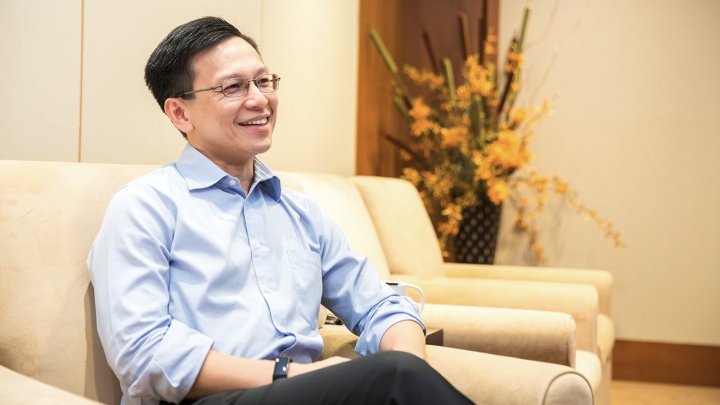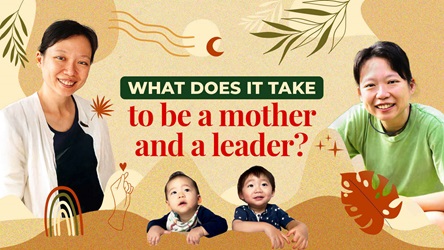Conviction For Collaboration – A Service-Wide Need

For over an hour, fielding questions on his decades-long career in the Public Service, Mr Lai Chung Han repeatedly uses a certain C-word to ground his answers.
“For each ministry, we must find that conviction that citizen engagement is integral to our mission success,” he says, of the nation-wide effort called Singapore Together. Mr Lai chairs the Public Sector Transformation (PST)-Committee on Citizen Engagement, which supports the Singapore Together effort.
All public officers, whether they deal with the public directly or not, need to be familiar with citizen engagement – because policies are enacted on the ground. Mr Lai says: “Even if you are not front-facing and citizen-facing, you need to have a sense of what your colleagues go through on a day-to-day basis.”
The C-word, if you are wondering, is “conviction”. As he adds: “Without that conviction, I think there will be effort, but I don’t think we’ll get to the right outcomes.”
And building that conviction starts from the top. As the Ministry of Education (MOE)’s Permanent Secretary, Mr Lai likes to use two photos to explain to colleagues the need for transformation and engagement: a jeep's tyres being changed as the vehicle is still moving highlights the need for change as the current system continues to function, and a sculpture at MOE headquarters, with a hand raising up a child, serves as a reminder of the organisation’s purpose.
At the MOE, especially, “you can change the programmes and structures, but you can’t change behaviours unless you have engaged those who are intimately involved: parents, students and educators,” he says.
Videos by Eric Lin
A government that works with citizens
An outcome that Singapore Together aims for is a shift “from a government that focuses primarily on working for you, to a government that works with you”, as Deputy Prime Minister Heng Swee Keat outlined in June.
Part of the nationwide effort is the Citizens’ Panel on Work-Life Harmony, where the government and citizens worked together to propose and design solutions for promoting work-life harmony.
Manpower Minister Josephine Teo, who launched the citizens’ panel, described it as “a chance for Singaporeans to have a direct hand in shaping the Singapore we want to live, work, and raise our families in”.
Echoing a sentiment that has been expressed for such engagement efforts, Mr Lai says the “government will never have a monopoly of ideas or answers to all national issues”.
Public participation is key for national programmes. This is a familiar area for the MOE, where Mr Lai has served since 2017, first as Second Permanent Secretary, then as Permanent Secretary from April 2019.
From 2021, students taking the Primary School Leaving Examination (PSLE) will be graded according to eight bands known as Achievement Levels. These wider grade markers will replace the current T-score system that finely differentiates a student’s performance, relative to the rest of his cohort.
In 2024, primary school streaming, often flagged for causing stress to students, will be replaced by subject-based banding, where students take subjects at different levels of difficulty.
“Changing the scoring system is one thing, but unless parents are with you, unless you have engaged them and won them over, I think the experience on the ground will still largely be the same,” he says.
Videos by Eric Lin
Trust that goes both ways
Besides being open to public feedback, citizen engagement also requires mutual trust, such that the government can point out criticism that might be unfair, says Mr Lai.
In August, he spoke to a group of parents about how the MOE can engage and involve them more. One parent said that consultation on PSLE changes, after the fact, does not count as engagement. Mr Lai disagreed with her claim.

He pointed out to her that the current PSLE changes came about precisely as a response to prior feedback, during the Our Singapore Conversation exercise in 2012.
The parent took Mr Lai’s response “very well”, Mr Lai says. An engagement exercise is not about trying to satisfy everyone – “and you can’t,” he adds, noting that some parents have asked for the PSLE to be scrapped, while others have asked to keep it – but about hearing different points of views.
Citizen engagement also requires “being transparent and candid enough to say there are trade-offs that require some prioritisation” and, with trust, the public will be “prepared to go with you”, he says.
Strategic redesign at the Navy
Before moving to the MOE, Mr Lai spent 25 years in the Singapore Armed Forces as a naval officer. He was promoted to Rear Admiral before assuming the post of Chief of Navy, which he held from 2014 to 2017.
One challenge the Singapore Navy faces, he says, is the constant need to make its importance and relevance known, because “the maritime domain is most removed from the public”.
Unlike the Army, the Navy is much smaller and often deploys its forces far from Singapore. As part of a “strategic redesign” of the Navy, there was a focus on clarifying and amplifying what it means to be “A Maritime Force for a Maritime Nation”.
This theme manifested publicly during the Navy’s Golden Jubilee in 2017, when Prime Minister Lee Hsien Loong commissioned a new warship and then-President Dr Tony Tan presided over an international fleet review involving 20 foreign navies. “That was how we explained the value of the Navy to the public.”
Mr Lai still keeps in touch with his former navy colleagues, who, as parents, are “not shy to offer their views” about the education system. “They have grouses about this and that, but I think they believe that here in the MOE, we are trying to do the best we can, and their children are in good hands,” he says.
Sense of mission
Moving from the Republic of Singapore Navy to the MOE, he found that both organisations are similar in having “a strong sense of mission” and “being values-based”, he says.
It is a statement characteristic of a man who frequently raises the importance of conviction. In his personal life, for instance, his conviction is found in the time he makes for his family, even if that means early-morning runs with his teenage children. “If any of them asks for time to do something together, I would always say yes.” He also speaks fondly of his wife, whom he describes as his best friend and soulmate.
Videos by Eric Lin
Asked of his wish for the Public Service, he says it is to “believe in what we do”, a phrase he often uttered as Chief of Navy.
The C-word makes itself felt once more – for the 20th time. “Again, the sense of conviction. We must also seek to be great at what we do. So strive for excellence.”
Conviction, as he describes it, requires persistence. Conviction gets eroded when people become unsure of the value they bring to an organisation and get discouraged, he says. “As you persevere, as you build those strengths, that conviction can be again revived.”
Videos by Eric Lin

What’s in your Cuppa?
It’s either Chinese tea or just black tea*.
How often do you have it?
I get through several cups in a day.
*The tea he drinks is typically from gifts. He uses the same leaves from morning to the end of the day, topping up hot water in his Starbucks cup.
The takeaway
- POSTED ON
Dec 12, 2019
- TEXT BY
Simon Vincent
- PHOTOS BY
Norman Ng
-
Deep Dive
Singapore Agenda: The End Of Retirement?









